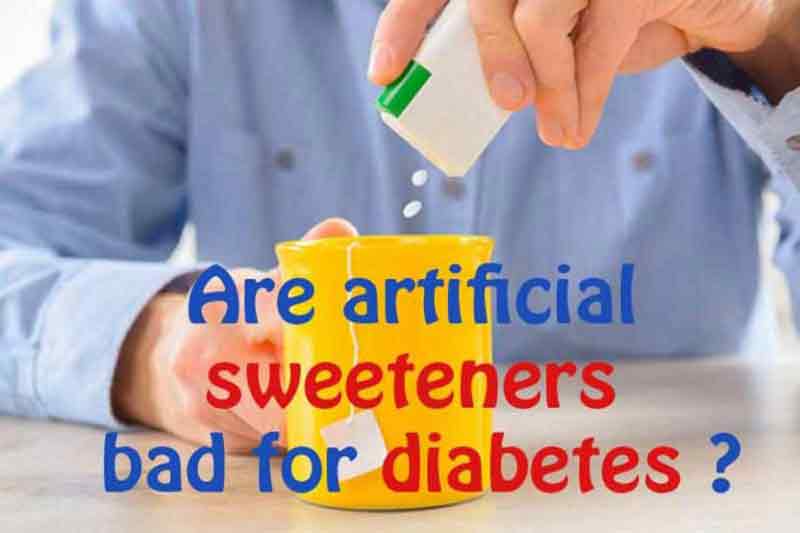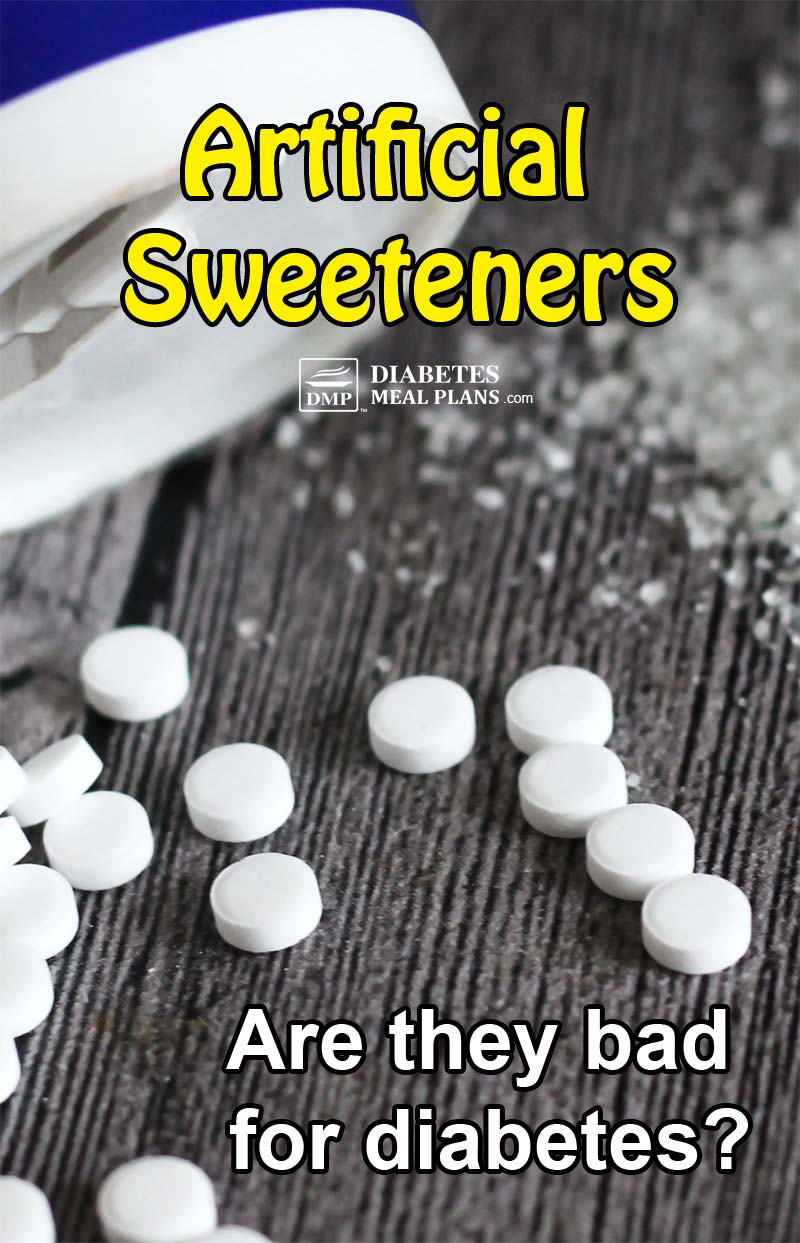Artificial sweeteners can now be found in thousands of products from ‘diet’ sodas, to ‘diet’ foods, to no sugar, low sugar, desserts, yogurts, chewing gum, and even some low fat products.
One of the proposed benefits of using artificial sweeteners is they help to lower your calorie intake. One teaspoon of sugar is 16 calories, while the equivalent in artificial sweetener is zero. And we still get to enjoy the sweet taste that us human beings seem to LOVE so much right?!
But are artificial sweeteners bad for diabetes?

Great question.
The American Diabetes Association recommends the use of artificial sweeteners, so does Diabetes Australia and UK, and dietitians commonly promote their use as well.
This was on the American Diabetes Association page about artificial sweeteners.

But do they really curb cravings? And how exactly do they affect us or diabetes?
Let’s turn to the science and see what it has to say.
What Are Artificial Sweeteners?
Artificial sweeteners can also be called high-intensity sweeteners, low-calorie sweeteners, and non-caloric sweeteners.
The main artificial sweeteners available are:
Saccharin – one of the oldest artificial sweeteners discovered in 1879.
In the 1970s and 80s there were some studies that showed saccharin caused cancer in rats. As a result there was a temporary warning put on labels but this was later removed as further studies suggested this cancer was not applicable to humans. There is still limited research available so this could be questionable.
Brand names: Sweet’N Low, Sugar Twin, Necta Sweet.
Aspartame – discovered in 1965, approved in 1981. Interestingly, all food industry funded studies show that aspartame is safe. But most independent studies show it has adverse health effects such as headaches, Alzheimer’s, attention deficit disorders, cancer, diabetes, and lupus. There have been over 10,000 consumer complaints lodged to the FDA in regard to aspartame. Questionable?? I’d say yes.
Brands: Equal, Nutrasweet, Natra Taste.
Acesulfame-K – discovered in 1967. The toxicity of acesulfame-K is still largely unknown because there has been no further testing since it’s introduction in 1970. Back then the standard criteria for designing toxicity studies was still being defined.
Brands: Sunette, Sweet One, Swiss Sweet.
Sucralose – discovered in 1976, approved for use in food products in 1998. Studies have shown it has adverse effects on gut bacteria, gut barrier function and digestive enzymes but overall it has been shown to be the least toxic and probably the safest choice when it comes to artificial sweeteners.
Brands: Splenda
Helps You Lose Weight…Does It?
Artificial sweeteners were largely introduced to help deal with the growing problem in overweight and obesity but when it comes to the evidence it just doesn’t stack up. There is little support to show that consuming them leads to weight loss.
In fact, what most of the research shows is the opposite effect.
Artificial sweeteners can increase risk of excessive weight gain.
Other risks associated with the consumption of artificial sweeteners
Research has shown increased risk for:
- Metabolic syndrome – high blood pressure, high cholesterol, weight gain, high blood glucose
- Type 2 diabetes
- Cardiovascular disease

Artificial Sweeteners and Gut Bacteria
A growing area of nutrition research right now is in the area of gut microbiota, or gut bacteria. Our gut bacteria are very important to being healthy. We have trillions of them in our digestive tract and the types of gut bacteria we have contribute to our metabolism, immune system, and the rate of inflammation in our body.
There is evidence that shows that artificial sweeteners alter the gut bacteria, increasing the growth of ‘bad’ bacteria, which can increase overeating, and impair blood glucose regulation.
Yes, that’s right, our gut bacteria play a role in glucose metabolism and regulation.
So instead of being ‘safe’ for blood sugar, in some cases blood glucose levels increase when consuming artificial sweeteners. It is not uncommon for people with diabetes to see a spike in blood sugar levels when they have artificial sweeteners.
This is because the sense of taste still activates the pathways of metabolism that eating sugar does. This process causes an imbalance of hormonal and neurological responses that has the opposite effect to what we might expect.
So Are Artificial Sweeteners Bad For Diabetes?
The evidence isn’t compelling enough to recommend them, therefore we generally encourage people to choose more natural sugar substitutes where the evidence for safety is better.
As for you, of course it is your choice and if you are going to include them, keep them to a minimum. And like all foods and beverages, test, test, test and see how it affects your own blood sugar levels.
Just remember though, if it doesn’t affect your blood sugar it still doesn’t make them safe, since there are studies that suggest they are not truly ‘safe’.
Wishing you the best in health :)
[accordion autoclose=”true” openfirst=”false” openall=”false” clicktoclose=”true”] [accordion-item id=”item-1″ title=”References+”]
References
Shankar et al. Non-nutritive sweeteners: Review and update. Nutrition. 2013;29:1293–1299.
Swithers S. Artificial sweeteners produce the counterintuitive effect of inducing metabolic derangements. Trends in Endocrinology and Metabolism. 2013;924(9).
Swithers S. Artificial sweeteners are not the answer to childhood obesity. Appetite. 2015.
Swithers et al. Experience with the high-intensity sweetener saccharin impairs glucose homeostasis and GLP-1 release in rats. Behavioural Brain Research. 2012;233:1– 14.
Pearlman et al. 2017. The Association Between Artificial Sweeteners and Obesity. Curr Gastroenterol Rep. 2017 Nov 21;19(12):64.
Gardener et al. Artificial sweeteners, real risks. Stroke. 2019 Mar; 50(3): 549–551.
[/accordion-item] [/accordion]

Elliot
Hi. I have been using Lakanto monk fruit drops to sweeten tea and a milk chocolate sweetened by erythritol, with inulin and stevia extract. What can you tell me about these ingredients? Thank you.
Jedha: Nutritionist (MNutr)
Monk fruit, erythritol and stevia are all good choices. Find more info on natural sugar substitutes here.
Cheryl L Riener
How about munkfruit?
Jedha: Nutritionist (MNutr)
Monk fruit is a suitable natural sugar substitute. Find more info here.
Elliot
Dear Jeda,
I thank you for your replies onmy monk fruit question and the other sweeteners used in chocolate. As usual, you are the best! Several articles all reassuring me on these choices. I thank you again!!!
Ron
Is Splenda safe for diabetics?
Jedha: Nutritionist (MNutr)
Check out this info on Splenda (sucralose) Ron.
Michael Rakhudu
Is honey good for diabetic
Malorie: Dietitian (MS, RD, CLT)
Hi Michael,
We do not recommend using honey regularly as it contains a significant amount of carbohydrates in a small amount. You can read more about our thoughts on honey here.
Jose Heleazar Solis
I want to thank you for your information. No one had ever given me the reason why sweet and low is not the best . thanks so much JEdha for the so much needed information. I will change.
Jedha
You’re welcome Jose. Glad it helped!
Siza
My Dr recommended xylitol but the Dietician sad no xylitol. She said I can take a teaspoon of sugar 3 times a day. I’m
blood AB, sugar is beneficiary for my type of blood in terms of the Book- Eat right for your type. Please advise I’m
confused.
Regards
Jedha
WHY did the dietitian say no xylitol Siza? Did they provide an explanation? Probably not. Erythritol seems to be a better choice than xylitol only because it is easier on most people’s digestive system. Unfortunately there was never any scientific evidence to support the blood type book and the advice that refined, added sugar is beneficiary is ridiculous. No refined, processed product is really beneficial for anyone!
Here at Diabetes Meal Plans we are a low carb, sugar free site and our info is based on the latest research. While 3 teaspoons of sugar is a low amount that you can probably manage, we don’t recommend sugar. Read more about sugar and fructose here, read more about sugar substitutes here.
It will all become clearer, just keep on learning :)
Bob
What about Stevia, is it ok for Diabetics?
Jedha
Hey Bob, yes stevia is the best option https://diabetesmealplans.com/252/best-sweetener-for-diabetics/
Susan L.
I could not agree with you more. Even though I am not diabetic I stay away from artificial sweeteners. On occasion I will use Stevia or SWERVE. Read a ton articles on both of these and they are the only ones I use and in moderation. I wish more people, especially with diabetes, were aware of the harm these artificial chemicals can cause.
Thanks for another wonderful awakening.
Susan
Jedha
Thank you Susan, glad you liked the info :)